
Mangalore, officially known as Mangaluru, is a major industrial port city in the Indian state of Karnataka and on the west coast of India. It is located between the Laccadive Sea and the Western Ghats about 352 km (219 mi) west of Bangalore, the state capital, 14 km north of Karnataka–Kerala border and 297 km south of Goa. Mangalore is the state's only city to have all four modes of transport—air, road, rail and sea. The population of the urban agglomeration was 619,664 according to the 2011 national census of India. It is known for being one of the locations of the Indian strategic petroleum reserves.

Dakshina Kannada district is located in the state of Karnataka in India, with its headquarters in the coastal city of Mangalore. It is part of the larger Tulu Nadu region. The district covers an area nestled in between the Western Ghats to its east and the Arabian Sea to its west. Dakshina Kannada receives abundant rainfall during the Indian monsoon. It is bordered by Udupi district to the north, Chikmagalur district to the northeast, Hassan district to the east, Kodagu to the southeast and Kasaragod district of Kerala to the south. According to the 2011 census of India, Dakshina Kannada district had a population of 2,083,625. It is the only district in Karnataka state to have all modes of transport like road, rail, water and air due to the presence of a major hub, Mangalore. This financial district is also known as the Cradle of Indian banking.
Canara Bank is an Indian public sector bank based in Bangalore, India. Established in 1906 at Mangalore by Ammembal Subba Rao Pai. The bank was nationalized in 1969. Canara Bank also has offices in London, Dubai and New York.

Udupi district is an administrative subdivision in the Karnataka state of India, with the district headquarters in the city of Udupi. It is situated in the Canara old north Malabar coastal region. There are seven taluks, 233 villages and 21 towns in Udupi district. The three northern tehsils of Udupi, Kundapur and Karkala, were partitioned from Dakshina Kannada district to form Udupi district on 25 August 1997. Moodabidri was officially declared as new tehsil (taluk), separated from Karkala with effect from 11 January 2018.
Bantwal Vaikunta Baliga (1895–1968) was a Konkani lawyer who played an active role in Indian governance and politics. He was actively involved in India’s struggle for freedom and worked several times with Mahatma Gandhi. He was elected as MLA and subsequently became the Law Minister and Speaker of the Mysore State Assembly. His term as Speaker spanned from March 1962 to June 1968. He is remembered for his parliamentary acumen, knowledge of legislative business, and understanding of parliamentary procedure. As the Speaker he was known to be very strict in conducting the House proceedings.
Mangalorean Catholics are an ethno-religious community of Latin Christians from the Diocese of Mangalore and the erstwhile South Canara area, by the southwestern coast of present-day Karnataka, India.
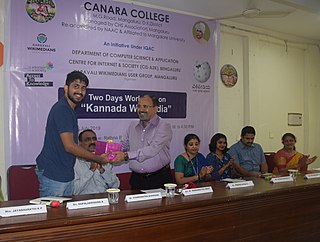
Canara College was started in 1973 by the C.H.S. Association, which has managed educational institutions since 1891. It is affiliated with Mangalore University.
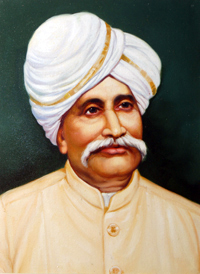
Ammembal Subba Rao Pai was a leading lawyer of Mangalore, India. He was the founder of Canara Bank, now one of India's leading banks, and Canara High School in Mangalore. Though he was a lawyer and a banker by profession, he was an educationist and social reformer by temperament. He helped shape the future of Dakshina Kannada District and of the GSB community in Karnataka.
Urwa is a residential locality in the city of Mangalore, in the state of Karnataka in India.
The culture of Mangalorean Catholics has been shaped by their Christianisation in Goa, their migrations& their captivity. They adopted elements of the local Mangalorean culture, but retained many of their Konkani customs and values. The ethnic Mangalorean houses of the older generation have spacious porticos, red oxide cemented floors, terra cotta roofs layered with the once famous Mangalore tiles. The houses are usually accompanied by their own private wells or ponds, and are normally attached to orchards of coconut trees, jackfruit trees, ice apple trees, Alphonso mango trees, areca nut trees etc.
The History of Mangalorean Catholics comprises three major eras. The first era consists of the cultural heritage shaped by Indo-Aryan migration into the Indus valley, later the migration to Govapuri and other prominent areas of the Konkan region, possibly due to a natural disaster that caused the drying up of the Sarasvati. Also, the various invasions and the political upheavals that followed in the pre-Partition eras of the northwest Indian subcontinent might be responsible for migration to Konkan in Western India. The second era was the legacy of Lusitanian culture, from the conversion of their Konkani ancestors to Roman Catholicism in the colonies of the Portuguese in Goa and Bombay, and the final era being the migration of the Roman Catholics in Goa to Mangalore and other parts of South Canara between the mid-16th and mid-18th centuries, forming a unique Mangalorean Catholic identity, and the subsequent growth and development of the community. Four centuries of living in South Canara gave these Catholics an identity of their own, distinct from Goans and Bombay East Indians.
Mangaloreans are a collection of diverse ethnic groups that hail from the historical locales of South Canara (Tulunaad) on the south western coast of Karnataka, India, particularly the residents native to Mangaluru.
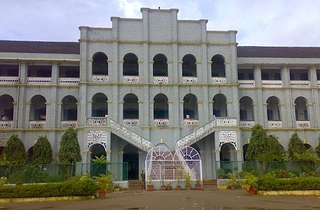
St. Aloysius is a private, coeducational, Jesuit deemed university, founded in 1880 as St. Aloysius College and located in Mangalore, Karnataka, India. With a 2022–23 enrollment of 5,436 undergraduate students and 1,587 postgraduate students and 69 research scholars, the institution specializes in academic programs in the humanities, commerce, science, technology, and management.
Participation of Mangalorean Catholics in the Indian Independence Movement recounts the community's role in the Indian Independence Movement.

Basti Vaman Madhav Shenoy was an Indian Konkani activist popularly known as Vishwa Konkani Sardar and was the founder of World Konkani Centre in Shakthinagar, Mangalore.
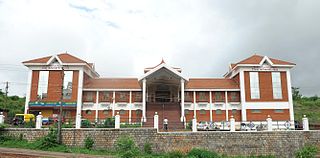
World Konkani Centre was founded by Konkani Bhas Ani Sanskriti Prathistan at Konkani Gaon, Shakti Nagar, Mangalore, to serve as a nodal agency for the preservation and overall development of Konkani language, art and culture involving all the Konkani people the world over.
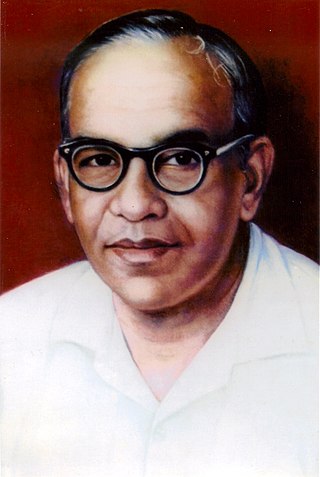
Vaman Srinivas Kudva, popularly called V. S. Kudva, was a founding director of Syndicate Bank, one of the oldest and major commercial banks of India.

Canarese Konkani are a set of dialects spoken by minority Konkani people of the Canara sub-region of Karnataka, and also in Kassergode of Kerala that was part of South Canara.
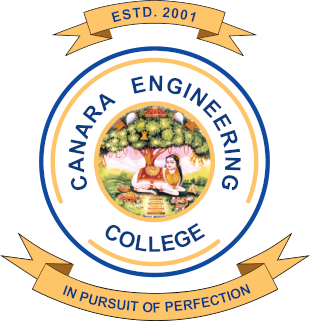
Canara Engineering College (CEC) is a private engineering college in Karnataka, India, approximately 22 km (14 mi) from Mangalore in the surroundings of Benjanapadavu. It was established in 2001 as a Millennium project by Canara High School Association. The college is affiliated to Visvesvaraya Technological University, Belgaum. It is also recognized by government of Karnataka and is approved by AICTE, New Delhi. Approximately 400 engineers graduate annually.
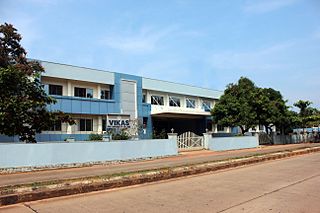
Canara Vikas Pre University College is an educational institution run by Canara High School Association, in Mangalore, Karnataka, India.
















